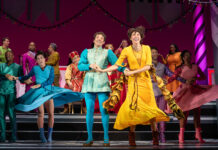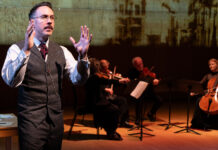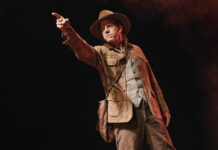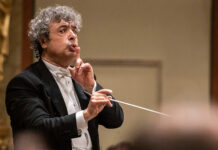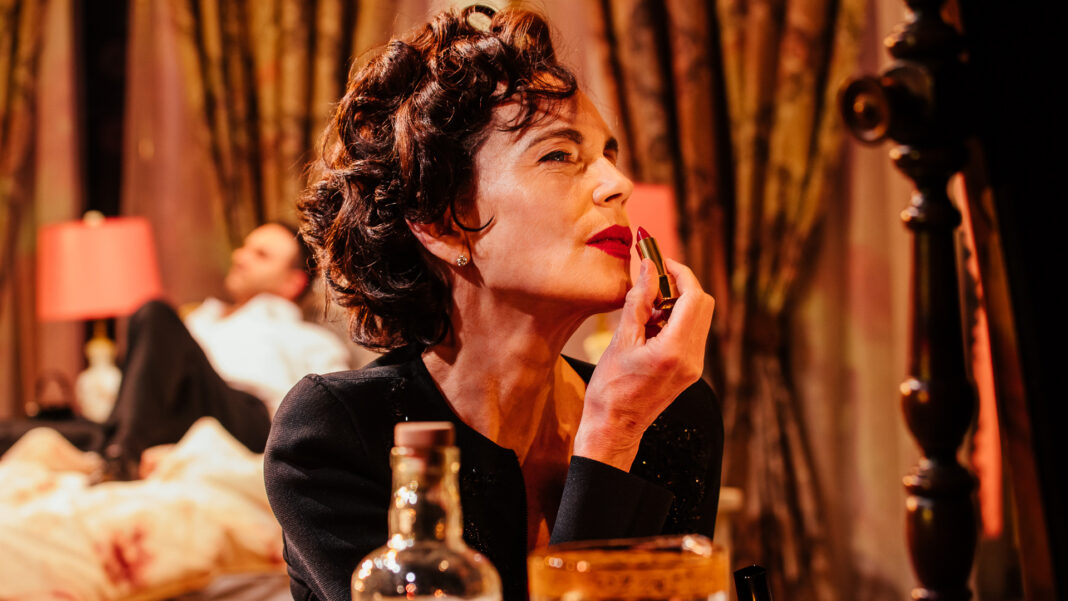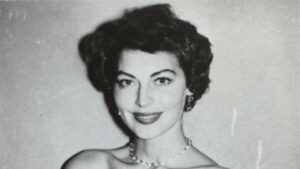
THIS IS THE TENTH OF OUR BEST OF 23 REVIEW OF INTERVIEWS: Legendary screen star Ava Gardner burst onto the scene with her performance as Kitty Collins in the 1946 film The Killers. From there she skyrocketed to fame appearing in such films as The Snows of Kilimanjaro, The Barefoot Contessa and The Night of the Iguana. Elizabeth McGovern first entered cinema lore for her role in the Oscar-winning film Ordinary People from 1980. She, too, found fame in such films as Ragtime, Once Upon a Time in America, King of the Hill (a personal favorite) and more recently, Downton Abbey.
McGovern has long been a fan of old Hollywood, but she also knows that era was not without significant challenges for women in the business. That was one of the reasons she set about writing the play Ava: The Secret Conversations.
It is based on the book by Peter Evans and Ava Gardner which was published after both its subject and the author had passed away. Gardner brought in Evans to write her autobiography in the 1980s.
In McGovern’s play, Gardner is an at-times reluctant interview. Evans (played by Aaron Costa Ganis) gets to the heart of her relationships with Mickey Rooney, Artie Shaw, Howard Hughes and Frank Sinatra. The way in which she depicts those relationships is one of the more intriguing aspects of the story being told.
The play was first performed in early 2022 in London. McGovern also starred as the screen legend. This week a revised version of Ava: The Secret Conversations officially opens at the Geffen Theatre in Los Angeles with McGovern once again playing Gardner.
I recently spoke with McGovern about the spell Gardner continues to cast on people, what she wanted to explore with the story and about the eternal appeal Hollywood has for people around the world. What follows are excerpts from our conversation that have been edited for length and clarity.
Actresses from Marcia Gay Harden (Sinatra) to Kate Beckinsale (The Aviator) have portrayed Ava Gardner at one point in their careers. What is the appeal that she continues to hold over us as a person, as a character, that inspired your desire to write about and portray her?
The more I looked into her life, the more I fell in love with her. I think there are a few reasons for that. One of them is she was such an authentic person. She was somebody who carried herself with actually quite a lot of humility. Yet she was incredibly smart and obviously so unbelievably beautiful.
I think one of the things that appeals to me about her is that she lived her life, in every decision she made, as a feminist, as a progressive person politically, as a very intuitively bright person. And yet she was never a someone who ascribed to any sort of cause. Her gift to the world was her life and her personality, even beyond the scope of her work as an actress.
Gardner is quoted as saying about herself, “What you have to understand about me, honey, is that I am a normal human being just like any other.” Do you see her as a normal human being?
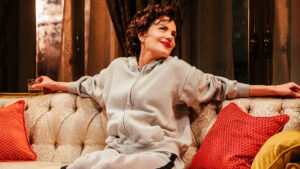
I think that is what presented itself to me as the challenge of the play and kind of the core of the play. You can see this very normal human being, somebody who considers herself to be just an average, not extraordinary person, [whose] image was blown up so big at that period of time in history – when movies were so incredibly powerful in the cultural imagination and how that impacted her personal life. It was, of course, a blessing and a curse and it did take a toll. That’s one of the things I’m hoping to explore in the play.
And I’m hoping that what the play does is that it makes you fall in love with all those old movies and the images they created and the ideas, particularly of romantic love, that hold the public imagination so deeply. But it also explores the sometimes detrimental impact that had on the actual participants in the machine.
Speaking of that machine, did you come to any conclusions either in research or in your writing as to whether actors had it any easier then than actors do now?
That’s a very interesting question. I think that they don’t have it any easier now. I think things have changed and I think that there is, particularly in the last couple of years, an increased awareness about the pitfalls of the whole system and that there is now a language to deal with it that they did not have in Ava’s day.
I wanted to portray this character very much as a woman of her time. A woman that experienced the particularly machismo aspects of the Hollywood culture without having any concept or idea that she could expect anything different than the kind of experience she had. And literally without having the language to grapple with it that we have today. So I wanted to look at that from today’s perspective, but keep her every inch who she was, not make her a modern woman of today.
What did you learn from the London production and how did that influence the changes that you’ve made in the play prior to opening in Los Angeles?
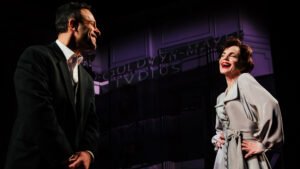
Thank you also for asking me that question, because I feel so grateful to the London production for teaching me so much about playwriting and particularly this kind of challenge that I gave myself in this piece. I think mostly I was able to improve the Peter story and improve the story of the the growing relationship between Peter and Eva and their journey toward intimacy as two people that embarked on this project together.
I think I’ve gotten a lot closer to doing what I wanted to do with bringing their mutual journey together alive.
It also strikes me that the intimacy between Eva and Peter serves as perfect counterpoint to these disastrous relationships she had in her life.
That’s absolutely right. I wanted to give her a journey of intimacy with Peter that was, in some ways, the mirror journey that one takes when they’re embarking on romantic escapades with people. That there’s a beginning, middle and end arc to it. A person and their biographer do go on a journey of intimacy because they are getting close through the conversations they have. So I thought it would be a kind of a perfect sort of metaphor.
In reading the transcripts that became Peter’s book has it given you any thoughts as to whether you would ever want to do an autobiography with a writer?
Oh, no! There’s no way in hell I would ever contemplate it. Not in this lifetime.
As the playwright you have ideas that you want to express in certain ways. As the actress you’re on stage bringing those words and ideas to life. Has the actress side of you ever had different thoughts than the playwright side of you and have you had to reconcile what seems good on paper but works differently on stage?
That’s an interesting question. Yeah. What I really miss saying is that thing that you often say to bond with your fellow actor, “Who wrote this?” I really regret not being able to do that. You have to sort of put on a different brain. We are right now in our technical rehearsal and I’m just having to take my playwright brain and just put it in a drawer. I almost do find myself saying to Aaron at times, “Who wrote this shit” because it’s a different muscle that you have to make the thing work.
Ava’s story, apart from her own excesses, strikes me a study in how differently actresses are treated in the business than men. Was that an important part of her story for you? Does that also mirror some of your own experiences that you have faced?
Yes, of course. I’m not the first person to say that it is a man’s world. I have had a wonderful life in my career and I live eternally grateful for it every single day. Nevertheless, there’s no getting around the fact that I participate in a business that is geared to a man’s vision. The stories are, most of the time, the male story, the male point-of-view.
I’ve written a play that is also the male point-of-view that gives a platform for a woman to speak. That’s just the way it is and I think things are changing. I think it is a different world that my two daughters are entering. One of my daughters is starting a career in show business as a writer and I think she is changing things. She’s writing a different kind of thing than most of the scripts I did growing up in show business.
Sadly it’s still a lot tougher for women of a certain age than it is for men of a certain age.
Absolutely. Men are still sexy in their sixties and seventies. Women feel eternally ashamed of the most natural process in the world which is aging. I’m a product of my time as well. I feel it, but I don’t I don’t let myself indulge in it. But it’s hard to escape.
You’ve appeared on stage in plays written by William Shakespeare, Anton Chekhov, David Hare, Tina Howe and J.B. Priestley. What appeal does the stage have for you as an actor? Now that you’re a playwright, has that altered your perception of what it is to work in the theater?
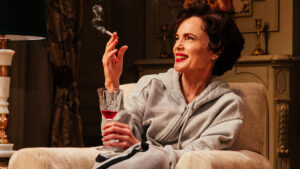
I feel more passionate about the theater than I ever have. Now we live in a world of too many screens. And the availability of screens at any moment of the day or night has cheapened their value. I feel like there is something very healthy psychologically about a group of people convening at a specified time and having an experience together that they share.
I’ve been working on almost exclusively plays for the last couple of years with the odd exception. But it it makes me feel more mentally healthy because I have to just decide to concentrate on one thing and to have a shared experience with a group of people rather than sit watching things in a kind of ad hoc way all the time on a screen, my phone or the TV.
I think there’s something that’s fracturing to us mentally about that. So I just believe that it’s important to ask people to sit down and give themselves over to a mutual exercise of concentration and then talk about it. Whether they like it or hate it, they’ve had this experience together that they can then share. I think it’s good for our brains. If I did nothing but theater for the rest of my life, I would be very happy.
You’ve been in the public eye since 1980 with your performance as Janine Pratt in Ordinary Peoplet. How has your own relationship with fame evolved since then?
I don’t think I think about it very much. I’m not sure I ever really did. It’s been on the periphery of my life for so long and it’s come and it’s gone. I’ve set up a structure for myself where it doesn’t really make too much difference to me one way or another. I have decided to just carry on. I’ve been doing this for really quite a long time. There’s obviously these [times] I’m experiencing a wave of attention and that goes. It doesn’t really affect my day-to-day that profoundly, to be perfectly honest.
Dirk Bogarde, who worked with Ava Gardner in The Angel Wore Raid and became a very close friend, said about her that she was “essential to the Hollywood myth about itself.” What can what can we learn about Ava Gardner from your play and about the myth of Hollywood? Did you want to debunk that myth?
I hope this is not unsatisfactory if I say that I want to express how much I love old Hollywood. At the same time I pick it apart and examine it so that one can see the danger and the pitfall of the machine. Basically it debunks the myth of the romantic love story and the hypocrisy that’s built into it.
Partly it’s the romantic love story that has tended to serve the man just like everything else. Like the me too aspect of the business of the powerful man exploiting his power. But it’s also this kind of the romantic idea that “I love you. I love you. I love you.” That means you serve my every need.
That’s part of the Hollywood myth that my mother and I – and her mother before her – bought into lock, stock and barrel as a woman. But I also loved it. I also love the images and I love love. I think that is an empowering feeling. So I want to do both. I want people to walk away and talk about that and come to their own conclusions.
Ava: The Secret Conversations runs through May 14th at the Geffen Playhouse in Los Angeles, California
Main Photo: Aaron Costa Ganis and Elizabeth McGovern in Ava: The Secret Conversations (Photo by Jeff Lorch/Courtesy Geffen Playhouse)


